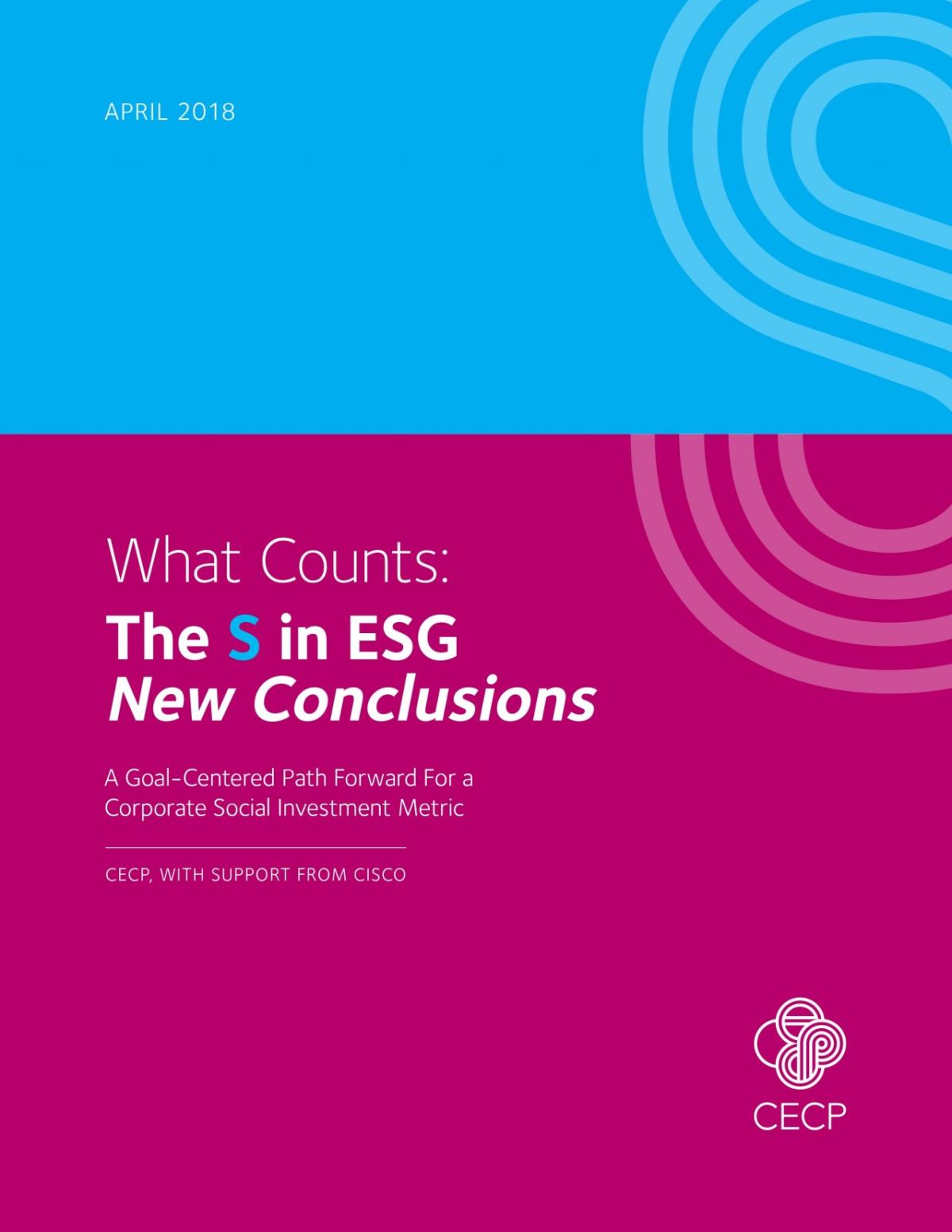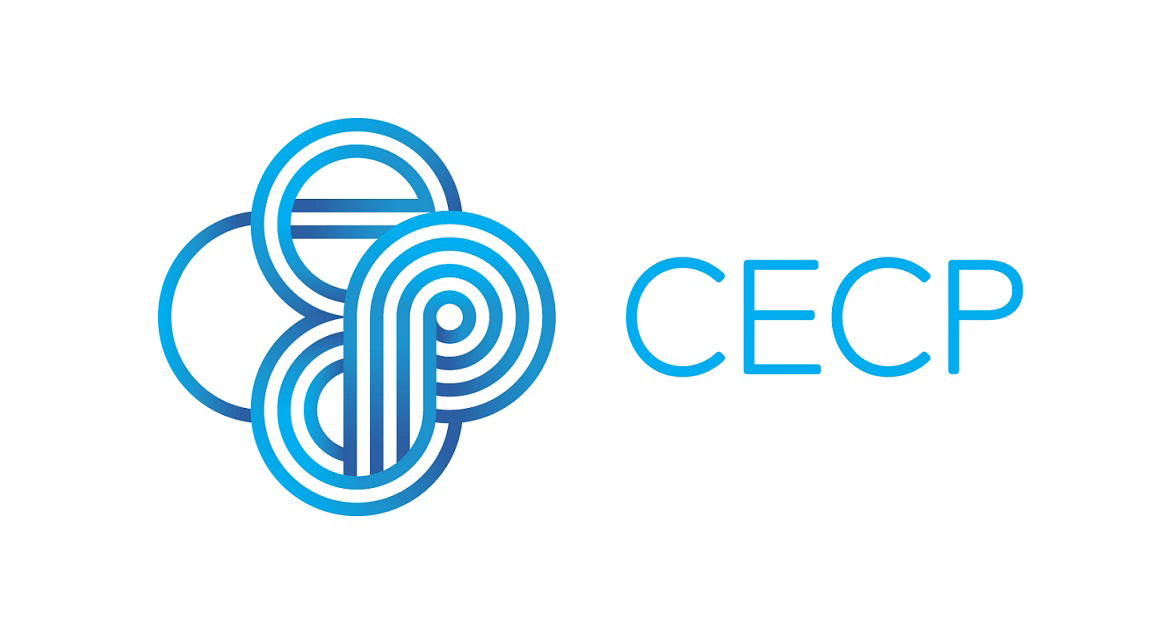For First Time, New Measure Can Capture a Company’s “Total Social Investment”
Investors, executives, and the public will be able to use Total Social Investment to compare how companies create value and invest for the long-term

NEW YORK, April 30, 2018 /3BL Media/—In a groundbreaking study released by CECP: The CEO Force for Good, the way companies calculate and report on their various programs and initiatives to improve society will fundamentally shift. In its report “What Counts: The ‘S’ in ESG, New Conclusions,” CECP, with support from Cisco, introduces an aggregated calculation called “Total Social Investment (TSI).” The calculation is a forward-looking reflection of the innovative ways companies invest in society. TSI offers a high-level and comparable snapshot for use by investors and other stakeholders to determine the value created by the “S” efforts in Environmental, Social, and Governance (ESG) measures.
“Leading companies have innovated in their social programs beyond what the traditional corporate social responsibility and philanthropy metrics measure,” said Daryl Brewster, CEO, CECP. “Today, companies view social investment as a competitive advantage. Total Social Investment provides companies a powerful tool to measure their work holistically. Under the notion that what gets measured, gets managed, Total Social Investment captures how companies are creating a better world through business.”
The TSI metric was created from company input after CECP published a flagship working paper in February 2017 and with support from USAA. That paper presented 40+ company case examples. Nine companies participated in a pilot to road test the TSI metric and help develop tools: CenterPoint Energy, Chevron, Cisco, Hershey, IBM, PayPal, Salesforce, Target, and USAA. In addition, a panel of eight leaders in the field participated in a Measurement Group of Experts and provided assessment and input in developing TSI.
TSI captures innovative initiatives that would have previously gone unmeasured: for example, new practices such as impact investing, the employment of individuals whose job it is to provide social services directly or collaborating with partners that aren’t formally organized non-profit organizations. TSI helps companies capture social investments beyond the donation of products or cash and takes into account the types of partners involved in social investment, the types of financial transactions companies undertake, and “shared strategies” that create both business value and social value. In addition, long-term-oriented investors will be able to evaluate a company’s management team assessment and management of ESG-related risks and opportunities.
CECP notes in the report that TSI works similar in principle to the way companies analyze their total investments in research and development. To calculate a company’s TSI, CECP summarizes seven categories of social efforts: Communities, Human Rights, Diversity (internal and external), Training, Health and Safety, and Labor Relations. The investments made in these seven business areas are then aggregated to determine company’s total investment of resources. It builds on the powerful, virtuous cycle of business rigor and benchmarking exhibited by CECP’s Giving in Numbers reports.
Companies affiliated with CECP, a coalition of more than 200 CEOs of the world’s leading companies that believe in creating a better world through business, reported struggling with the plethora of social metrics. In some cases, this was because traditional metrics didn’t account for innovations beyond donations. In other cases, previous measures separated out cross-departmental initiatives from the outcomes intended by such programs. For example, old metrics wouldn’t capture how a company manages its supply chain in order to promote human rights or health and safety.
“This work was inspired and shaped by business leaders who told us that their companies were doing so much more than what was being counted.,” said Carmen Perez, Director, Data Insights at CECP and lead author of the report. “Total Social Investment is their answer. It still allows the company to determine their best set of ‘S’ metrics individually, and then report TSI as the holistic summary that creates the platform for comparison.”
In recent years, companies have faced growing demand for data. According to a Goldman Sachs study citing Bloomberg data, the explosion of sustainability or ESG reporting has led to over six million data points being reported by companies across 450 metrics in 2016. TSI won’t replace existing reporting frameworks, such as the Global Reporting Initiative or Sustainability Accounting Standards Boards, or the metrics those frameworks outline. Rather, companies can use TSI to “roll-up” the many social investments they make regardless of the reporting framework and individual metrics they use.
Once the TSI measure is implemented on a broad scale, companies will be able to capture initiatives that currently aren’t reflected in many Environmental, Social, and Governance (ESG) metrics. Using TSI will also help business leaders and stakeholders cross-compare corporate social investment strategies between sectors and entire industries.
The shared goal is to get all companies to adopt the TSI measure by 2020. To help companies adopt the measure, the report includes suggestions on the ways in which current social metric frameworks – such as CECP’s own Valuation Guidance - should expand. The study also includes a decision tree tool to help companies categorize their investments.
The report is available for free after registration on CECP’s web site: www.CECP.co
###
ABOUT CECP: THE CEO FORCE FOR GOOD
CECP is a CEO-led coalition that believes that a company’s social strategy — how it engages with key stakeholders including employees, communities, investors, and customers —determines company success. Founded in 1999 by actor and philanthropist Paul Newman and other business leaders to create a better world through business, CECP has grown to a movement of more than 200 of the world’s largest companies that represent $7 trillion in revenues, $18.6 billion in societal investment, 13 million employees, and $15 trillion in assets under management. CECP helps companies transform their social strategy by providing customized connections and networking, counsel and support, benchmarking and trends, and awareness building and recognition.

